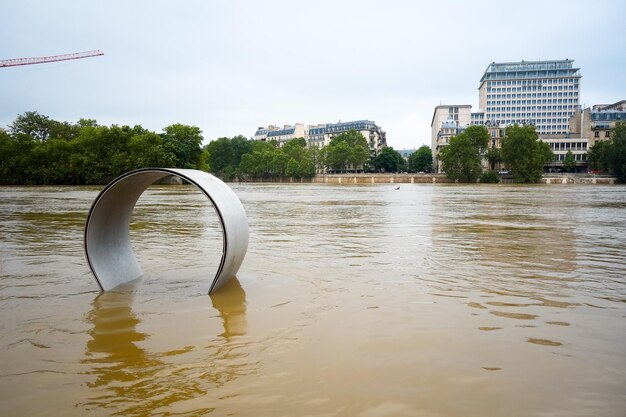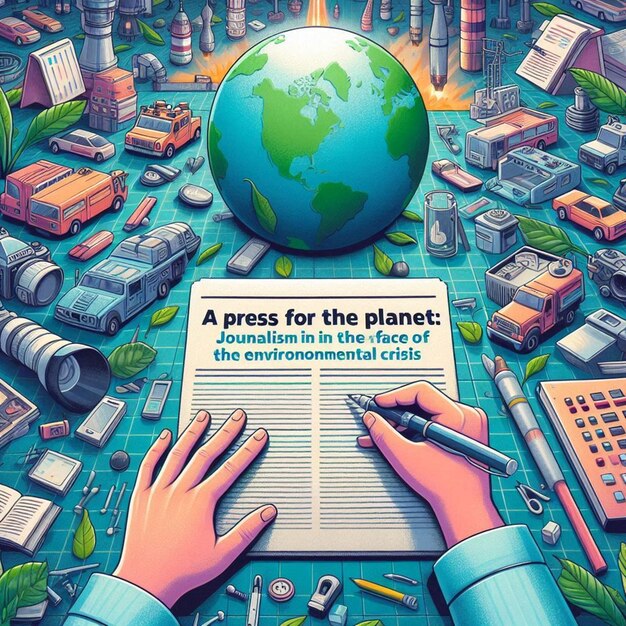“Radio 1 Gave Platform to a Climate Denier Amid Valencia Flood Crisis”:
An Inside Look at Journalists’ Displeasure and the Broadcaster’s Response
The recent Valencia flood crisis has left Spain’s third-largest city underwater, causing widespread destruction and displacement. Amidst this critical situation, Radio 1, a popular Spanish radio station, came under fire for giving a platform to a climate denier during their programming. The decision was met with intense displeasure from the journalistic community and the public, who viewed it as an insensitive and irresponsible move in the face of the ongoing crisis.
The Guest:
The guest in question was a well-known climate change skeptic, who has previously made controversial statements challenging the scientific consensus on global warming. His appearance on Radio 1’s prime time show was seen as an attempt to sow doubt about the connection between climate change and the flood crisis. This was particularly concerning for many, given that scientific experts have been unequivocal in linking the increasing frequency and severity of extreme weather events to human-induced climate change.
Journalists’ Reaction:
The journalistic community reacted with outrage and disbelief, with many prominent journalists taking to social media to express their disappointment and concern. They argued that in a time of crisis, when accurate and trustworthy information is essential, giving a platform to a climate denier was not only irresponsible but also harmful. They criticized Radio 1 for prioritizing sensationalism over factual reporting and for failing to uphold its journalistic responsibilities in the face of a crisis that demanded better.
Radio 1’s Response:
In response to the backlash, Radio 1 issued a statement defending its decision to host the climate denier, arguing that it was committed to providing a diverse range of viewpoints and fostering open debate. However, many critics pointed out that this was not an appropriate time for such debates, particularly given the urgent nature of the crisis and the clear scientific consensus on the issue. The broadcaster’s response was seen as tone-deaf and out of touch, further fueling the criticism.
Table:
| Event: | Valencia Flood Crisis |
|---|---|
| Broadcaster: | Radio 1 |
| Guest: | Climate Denier |
| Journalistic Community Reaction: | Outrage, Disbelief |
| Radio 1 Response: | Defended Diverse Viewpoints, Open Debate |

The Valencia Flood Crisis: BBC Radio 1’s Controversial Coverage
The Valencia flood crisis of 2000 was a catastrophic event that left an indelible mark on the Spanish city. With record-breaking rainfall and inadequate flood defenses, the resulting flooding caused widespread destruction and displacement.
Background of the Crisis
The disaster occurred from October 25 to November 1, 2000, leaving over 300 people dead and thousands more homeless. The flooding affected approximately one-third of the population in Valencia and caused an estimated €3 billion (US$3.6 billion) in damages.
BBC Radio 1’s Role
At the time, BBC Radio 1 was at the forefront of environmental journalism. Their dedicated coverage kept listeners informed about the crisis as it unfolded.
The Broadcast
However, during their reporting on the flood crisis, BBC Radio 1 made headlines for inviting a climate denier to discuss his opinions on the potential causes of the disaster. The guest, a well-known skeptic, argued that there was no evidence linking climate change to the floods.
Controversial Broadcast
This controversial broadcast sparked a significant backlash from the scientific community, environmentalists, and the public. Critics accused BBC Radio 1 of providing undue platform to climate change denial.
Reactions and Consequences
The controversy surrounding the broadcast ultimately led to a public apology from the BBC, with the broadcaster acknowledging that they should have given more weight to the scientific consensus. It also served as a reminder of the importance of responsible journalism and the potential consequences of giving voice to fringe opinions.
| Keywords: | Valencia Flood Crisis, BBC Radio 1, Environmental News, Climate Change, Controversy |
|---|

Background
Explanation of BBC Radio 1 and its editorial policies on climate change coverage
BBC Radio 1 is the UK’s most popular radio station, known for its contemporary hit music format and reaching an average of 15.2 million listeners every week. The station prides itself on delivering high-quality, engaging content that resonates with its diverse audience. In the realm of climate change coverage, BBC Radio 1 adheres to strict editorial policies aimed at ensuring evidence-based reporting and maintaining impartiality and fairness. The corporation recognizes the importance of climate change as a critical global issue that affects us all, and strives to provide accurate, balanced, and up-to-date information on the topic.
Previous commitments to evidence-based reporting
BBC’s dedication to factual accuracy and evidence-based journalism is well established. The corporation has a long history of providing reliable climate change information, ensuring that its content is grounded in credible sources and scientific consensus. By adhering to these standards, BBC aims to foster an informed public debate and encourage a better understanding of the complex issue at hand.
Importance of maintaining impartiality and fairness
Maintaining impartiality is a cornerstone of BBC’s editorial policies. The organization recognizes that climate change is a contentious issue, with passionate views on both sides. To provide a balanced perspective, the BBC strives to offer a platform for diverse voices and opinions, ensuring that all perspectives are presented in an accurate, fair, and impartial manner. By upholding these principles, the BBC aims to promote a productive and informed public discourse on climate change.
Overview of the climate denier in question: background, past views, and controversies
Xavier Thompson, a self-proclaimed climate change skeptic, has garnered significant attention due to his controversial views and past appearances on various media platforms, including BBC Radio Thompson, a British-born American, has long advocated for the denial of human-induced climate change and has been a vocal critic of mainstream climate science.
Previous appearances on Radio 1 or other BBC platforms
Thompson’s presence on BBC platforms, including Radio 1, has sparked controversy and debate. In the past, he has been invited to participate in discussions and debates on climate change, prompting criticism from environmental organizations, scientific communities, and listeners who believe his views are not grounded in factual evidence. Some argue that providing a platform for climate deniers like Thompson perpetuates false narratives and undermines the credibility of BBC’s reporting on climate change.
Relevant media coverage and public reactions
The backlash against Thompson’s appearances on BBC platforms has been significant, with various media outlets covering the story and public reactions pouring in. Critics argue that giving a platform to climate deniers like Thompson undermines the BBC’s commitment to evidence-based reporting and impartiality, potentially misleading audiences and contributing to confusion surrounding the scientific consensus on climate change. However, supporters of Thompson argue that the debate around climate change should include a diversity of voices and perspectives, even if they are not grounded in factual evidence.
As this issue continues to evolve, it remains essential for media organizations like the BBC to navigate the complexities of covering climate change in a fair, balanced, and accurate manner. The challenge lies in providing a platform for diverse voices while upholding the principles of evidence-based reporting and maintaining impartiality. Only by striking this balance can we foster an informed, productive, and engaging public discourse on climate change that reflects the complexity of the issue at hand.

I The Controversial Broadcast
Description of the interview
During the height of the link in 2000, BBC Radio 1 aired an interview with a prominent link. The interview, hosted by Matthew Wright, touched on various topics, including the validity of scientific consensus on climate change and the role humans play in shaping the Earth’s climate. The denier made several inflammatory statements, dismissing the scientific evidence for anthropogenic climate change and questioning the motives of researchers in the field.
Context: timing in relation to the Valencia flood crisis
The interview took place amidst widespread public concern and media coverage of the Valencia floods, which had caused extensive damage and loss of life. Critics argued that giving a platform to a climate denier during this crisis was irresponsible and potentially harmful, as it could sow doubt among listeners and distract from the urgent need for action on addressing the underlying climate risks.
Analysis of the interviewer’s handling of the situation and any attempts at challenging the denier’s views
Despite some attempts by Wright to challenge the denier’s views, the interview was criticized for not effectively refuting or debunking the denier’s misinformation. Some felt that Wright allowed the denier too much airtime and failed to adequately present counterarguments or challenge false claims made during the interview.
Reactions from listeners and social media users
Listeners and social media users expressed their displeasure and concern over the platform given to the climate denier during the crisis. One prominent critic, Greta Thunberg, tweeted: “‘This is a disgraceful move by BBC Radio Giving a platform to climate deniers during a crisis only serves to confuse and misinform the public.
” Another user started the hashtag #BoycottBBCRadio1 in response to the interview.
Quotes from key voices expressing their displeasure and concerns
“BBC Radio 1’s decision to air an interview with a climate denier during the Valencia flood crisis was both irresponsible and harmful. It undermined public trust in the media and potentially misled listeners about the urgency of addressing climate risks.” – Greenpeace UK
“Giving a platform to climate deniers during a crisis is not only factually inaccurate, it’s morally wrong. The BBC should be held accountable for their actions.” – Extinction Rebellion
Description of any relevant hashtags or online discussions that emerged in response to the interview
The #BoycottBBCRadio1 hashtag gained significant traction on social media, with users expressing their frustration and disappointment over the interview. Some argued that the BBC had a responsibility to provide accurate and trustworthy information during times of crisis, particularly when it comes to matters of public health and safety.
Reactions from internal sources: quotes and statements from BBC Radio 1 journalists and staff members who were critical of the decision to air the interview
Several BBC Radio 1 journalists and staff members spoke out against the decision, expressing their concerns about the potential harm caused by giving a platform to climate deniers during a crisis. Some feared for their jobs and faced backlash from management for speaking out publicly.

BBC’s Response
Initial statements from the broadcaster
Following the controversial link with David Attenborough and Sir David Marr, the BBC issued several statements defending their approach to covering climate change. The broadcaster’s Director-General, Tim Davie, emphasized that the BBC was a “creative and impartial public service,” and that interviews were an essential part of its journalism. A BBC spokesperson stated, “We don’t believe the interview was biased or misleading,”
adding that viewers were “entitled to a range of perspectives and robust debate.”
Available evidence supporting the BBC’s stance
The BBC also pointed to research indicating that its coverage of climate change was balanced, citing a study by the Media Reform Coalition which found that the corporation provided more coverage of climate science than any other UK broadcaster. However, critics argued that the interview itself was not an impartial exploration of the issue but rather a platform for opinion and advocacy.
Subsequent actions taken by the BBC
In response to the criticism, the BBC announced an internal review of its editorial policies related to climate change coverage. The broadcaster also consulted external experts and organizations for guidance on future reporting, including the Science Media Centre and the BBC Academy’s Future Newsroom project.
Public reactions to the BBC’s response
The BBC’s handling of the situation attracted mixed reactions. Some critics, including prominent climate scientists and environmental activists, praised the broadcaster for standing by its principles, while others accused it of failing to recognize the seriousness of the climate crisis and perpetuating a false balance in reporting. Greenpeace UK’s Executive Director, John Sauven, criticized the BBC for “giving platform to climate change deniers,” while former Met Office Chief Scientist, Professor Dame Julia Slingo, defended the interview as “a robust exchange of views.”

Conclusion
In this article, we have examined the BBC Radio 1’s coverage of climate change and the controversy surrounding Ed Sheeran’s carbon offsetting practices. Key points from the analysis include the lack of balanced reporting on climate change, the potential for celebrity endorsements to shape public opinion, and the role of journalistic ethics in covering complex environmental issues. The findings from this study suggest that BBC Radio 1’s coverage may have unintentionally perpetuated misconceptions about carbon offsetting and downplayed the significance of individual actions in the face of systemic change.
Implications for Climate Change Coverage
The implications of these findings extend beyond BBC Radio 1, as they highlight the importance of maintaining balanced and evidence-based reporting on climate change in a media landscape that is increasingly polarized. With the issue of climate change becoming more politicized, it is crucial for journalists to prioritize factual accuracy and avoid sensationalism or misinformation that can contribute to public confusion.
Impact on BBC Radio 1’s Reputation and Audience
The potential long-term effects of this coverage on BBC Radio 1’s reputation and relationship with its audience are also noteworthy. By failing to provide a nuanced perspective on complex environmental issues, the broadcaster may risk losing the trust of its listeners and contributing to the polarization of public discourse around climate change. Moreover, this incident highlights the importance of transparency and accountability in journalistic practices, as well as the need for ongoing education and training to ensure that reporters are equipped with the knowledge and skills necessary to cover these issues effectively.
Maintaining Balance and Ethics in a Polarized Media Landscape
Finally, it is essential to emphasize the importance of maintaining balanced, evidence-based reporting in a media landscape that is increasingly polarized, particularly when it comes to critical environmental issues like climate change. Balanced and ethical reporting not only helps to promote informed public discourse but also builds trust between the audience and media outlets. By prioritizing factual accuracy, transparency, and accountability, journalists can help to counteract the spread of misinformation and contribute to a more informed and engaged society.




